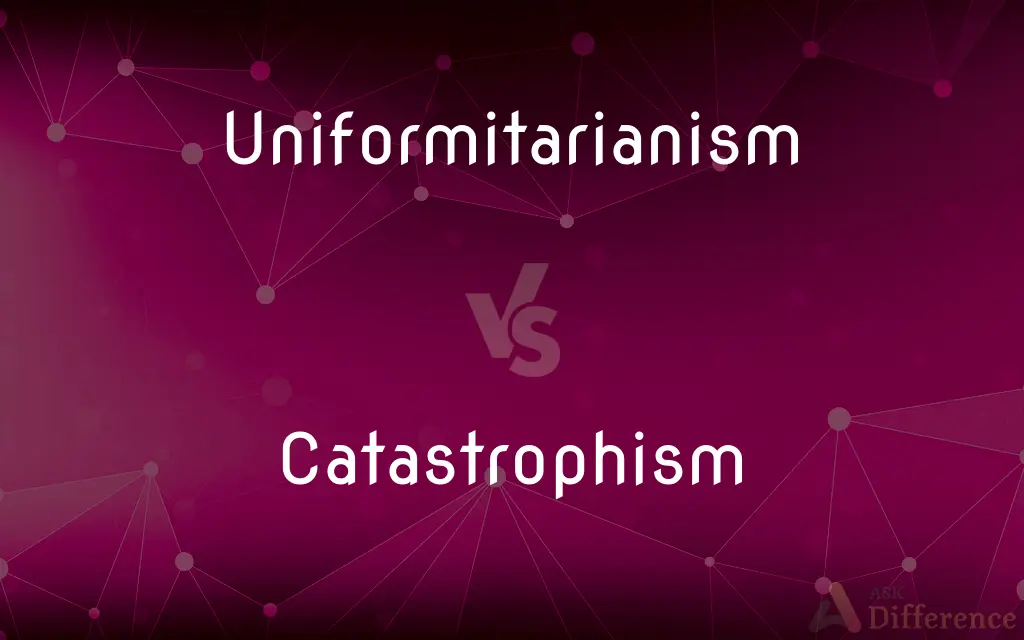Uniformitarianism vs. Catastrophism — What's the Difference?
By Tayyaba Rehman — Updated on October 31, 2023
Uniformitarianism posits that Earth's processes have remained consistent over time, while Catastrophism asserts that Earth's features resulted from sudden, major events.

Difference Between Uniformitarianism and Catastrophism
Table of Contents
ADVERTISEMENT
Key Differences
Uniformitarianism is a principle in geology suggesting that the same natural processes that operate in the present-day have always done so in the past at similar rates. Catastrophism, in contrast, proposes that Earth's geological features are best explained by sudden, short-lived, violent events.
Uniformitarianism's viewpoint, often summarized by the phrase "the present is the key to the past," implies that by studying current processes, we can infer past events. Catastrophism, however, might argue that large-scale events like floods, volcanic eruptions, or asteroid impacts have had a more significant role in shaping the Earth.
While Uniformitarianism offers a steady, consistent explanation of Earth's history, Catastrophism presents a more episodic account of dramatic events disrupting long periods of stability.
Both theories, in their purest forms, have had proponents and critics; however, modern geology often adopts a more integrated approach, recognizing the role of both consistent processes and catastrophic events in Earth's history.
Comparison Chart
Basic Concept
Earth's processes remain consistent over time.
Earth's features result from sudden, major events.
ADVERTISEMENT
Key Proponents
James Hutton, Charles Lyell.
Georges Cuvier, William Whiston.
Philosophical Approach
Steady and consistent processes.
Episodic, dramatic events.
View of Earth's History
Long, continuous processes.
Disrupted by significant catastrophes.
Modern Interpretation
Integrated in current geology, emphasizing consistent processes.
Recognized in current geology, especially for significant events.
Compare with Definitions
Uniformitarianism
Geologic principle asserting consistent Earth processes.
Uniformitarianism helps geologists understand ancient sedimentary layers using current processes.
Catastrophism
Contrasts with steady, consistent geologic processes.
In contrast to slow sediment build-up, Catastrophism might cite a singular event causing sediment layers.
Uniformitarianism
Basis for much of historical geology.
Modern geology uses Uniformitarianism to decode Earth's long history in rock layers.
Catastrophism
Belief in sudden, major events shaping Earth.
Catastrophism could attribute canyon formation to a massive flood event.
Uniformitarianism
"The present is the key to the past."
By observing river erosion today, Uniformitarianism lets us infer past erosional patterns.
Catastrophism
Used to explain seemingly sudden changes in geologic record.
Catastrophism helps explain abrupt changes in fossil records during certain periods.
Uniformitarianism
Opposes episodic catastrophic events as primary shapers.
Uniformitarianism would question a sudden global flood as a primary landscape former.
Catastrophism
In geology, catastrophism theorises that the Earth has largely been shaped by sudden, short-lived, violent events, possibly worldwide in scope. This contrasts with uniformitarianism (sometimes called gradualism), according to which slow incremental changes, such as erosion, brought about all the Earth's geological features.
Uniformitarianism
Assumes steady rates of Earth's processes.
Through Uniformitarianism, slow plate tectonics are seen as shaping continents over eons.
Catastrophism
The doctrine that major changes in the earth's crust result from sudden catastrophes, such as the impact of a large meteor, rather than from gradual evolutionary processes.
Uniformitarianism
Uniformitarianism, also known as the Doctrine of Uniformity or the Uniformitarian Principle, is the assumption that the same natural laws and processes that operate in our present-day scientific observations have always operated in the universe in the past and apply everywhere in the universe. It refers to invariance in the metaphysical principles underpinning science, such as the constancy of cause and effect throughout space-time, but has also been used to describe spatiotemporal invariance of physical laws.
Catastrophism
The doctrine that changes in the earth's fauna and flora result from major catastrophic events that cause the die-off of many organisms and are followed by the appearance of new types of organisms.
Uniformitarianism
The theory that all geologic phenomena may be explained as the result of existing forces having operated uniformly from the origin of the earth to the present time.
Catastrophism
The prediction or expectation of cataclysmic upheaval, as in political or social developments.
Uniformitarianism
The scientific principle that natural processes operated in the past in the same way and at the same rates that they operate today.
Catastrophism
(geology) The doctrine that sudden catastrophes, rather than continuous change, cause the main features of the Earth's crust.
Uniformitarianism
The uniformitarian doctrine.
Catastrophism
(biology) The doctrine that, in addition to the more gradual effects of evolution, huge catastrophic events shape the earth's flora and fauna by causing major die-offs which make way for the emergence of new organisms.
Catastrophism
The practice or tendency of catastrophizing, regarding bad things as catastrophic.
Catastrophism
The doctrine that the geological changes in the earth's crust have been caused by the sudden action of violent physical causes; - opposed to the doctrine of uniformism.
Catastrophism
Emphasizes short-lived, violent events.
An asteroid impact, as proposed by Catastrophism, led to the dinosaurs' extinction.
Catastrophism
Offers episodic view of Earth's history.
Catastrophism might argue that long calm periods were punctuated by dramatic events.
Common Curiosities
What is Uniformitarianism's basic tenet?
Uniformitarianism posits that Earth's processes have remained consistent over time.
Which theory, Uniformitarianism or Catastrophism, dominated early geology?
While both had proponents, Catastrophism was more dominant in early geology.
Can Catastrophism explain events like asteroid impacts?
Yes, Catastrophism encompasses major events like asteroid impacts that cause significant change.
Is Uniformitarianism still relevant in modern geology?
Yes, it's integrated into modern geology, emphasizing the role of consistent processes over time.
How do the two theories view Earth's timeline?
Uniformitarianism sees long, consistent processes, while Catastrophism views history as disrupted by major events.
How does Catastrophism view Earth's formation?
Catastrophism believes Earth's features largely resulted from sudden, major events.
Do all geologists fully support one theory over the other?
No, many geologists recognize the value in both theories and integrate them into their interpretations.
Is it possible to combine aspects of both theories?
Modern geology often combines both, recognizing consistent processes and the role of significant events.
How does Uniformitarianism help geologists today?
It provides a framework to interpret ancient geologic events using current observable processes.
Which theory might support a global flood shaping landscapes?
Catastrophism might attribute major landscape changes to events like a global flood.
Has the balance between these theories shifted over time?
Yes, while Catastrophism was once dominant, Uniformitarianism gained ground, and now a balanced approach is often taken.
Who were some key proponents of Uniformitarianism?
Notable proponents include James Hutton and Charles Lyell.
Did Catastrophism have any famous supporters?
Yes, figures like Georges Cuvier and William Whiston supported Catastrophism.
How does Catastrophism explain abrupt fossil record changes?
Catastrophism can attribute sudden changes in the fossil record to significant, disruptive events.
Share Your Discovery

Previous Comparison
Problem vs. Complaint
Next Comparison
Object vs. ComplementAuthor Spotlight
Written by
Tayyaba RehmanTayyaba Rehman is a distinguished writer, currently serving as a primary contributor to askdifference.com. As a researcher in semantics and etymology, Tayyaba's passion for the complexity of languages and their distinctions has found a perfect home on the platform. Tayyaba delves into the intricacies of language, distinguishing between commonly confused words and phrases, thereby providing clarity for readers worldwide.














































